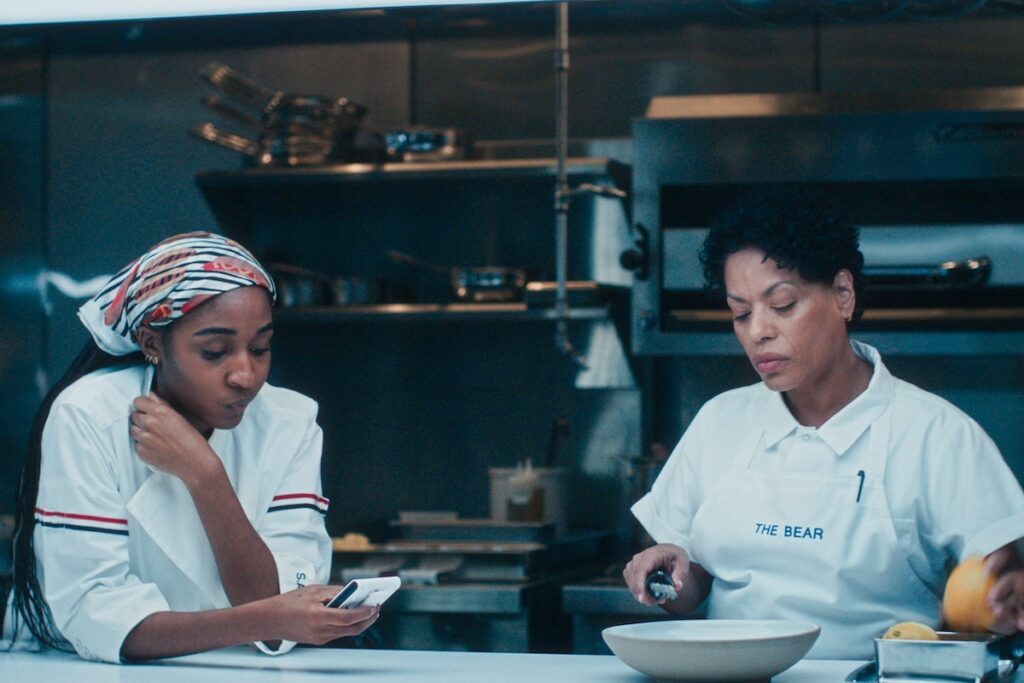Fourth Season of ‘The Bear’ Off to a Sluggish, Sentimental Start
While the show hasn’t exactly ‘jumped the shark’ into awful territory, the fourth season continues a dismaying trend begun in the third — namely a cluttered style substituting for thematic and narrative stagnation.

Television watchers dread the moment when a favorite show starts to go bad. The disappointment turns bitter when considering all the hours spent viewing, either through binging or weekly installments, only to have the program’s beloved characters, who at times almost become a part of one’s family, let down by poor plotting and tired ideas.
This viewer had such feelings while watching the first three episodes of the latest season of “The Bear,” the hit series about a restaurant and its staff available on Hulu and Disney+. While the show hasn’t exactly “jumped the shark” into awful territory, the fourth season continues a dismaying trend begun in the third — namely a cluttered style substituting for thematic and narrative stagnation. Now I, for one, loved some of the prior season’s measured, memory-laced pacing and bold experiments, both initially and later in the season, such as the heartbreaking flashback episode focused on cook Tina (Liza Colón-Zayas), and the birthing tête-à-tête between Sugar (Abby Elliott) and her mother (Jamie Lee Curtis) that constituted another.
These episodes, though, were outliers in what increasingly felt like a show treading water, or rather like a series bringing water to a boil but never dropping fresh ingredients into the pot. Unfortunately, the new season’s first few episodes repeat many of the laziest tropes and stultifying situations of the last. Right off the bat we’re treated to another talk about how restaurants are where special moments occur. Later on and once again, “Uncle” Jimmy (Oliver Platt) threatens to cut off the funding, and yet again head chef Carmy (Jeremy Allen White) and manager Richie (Ebon Moss-Bachrach) talk over each other, this time regarding the Chicago Tribune’s mixed review of the restaurant.
Lead character Carmy apologizes several times over the course of the three episodes, turning the show into something of a therapy session. If it feels like we’ve seen him say sorry many times before, it’s because we have, and the constant dazed expression on Mr. White’s face doesn’t help. Avoiding a decision on whether to work for another restaurant, chef Sydney (Ayo Edebiri) is also stuck, with the actress’s quirks and dramatic tics starting to come off as mannered. The writing seems to be testing the limits of these two actors’ abilities to play the same scene in different ways, and one hopes the rest of the season will allow for more variation in their characters’ emotional trajectories.

A main character still crackling with punchiness is Richie, and Mr. Moss-Bachrach delivers both some of the episodes’ funniest lines as well as one of its most touching moments during a short praying scene. Indeed, the scripts still frequently display such ample intelligence that one wishes they also didn’t rely so much on sentimentality and stale jokes.
One of the most egregious stylistic touches carried over from last season is the reliance on music to undergird emotion. Numerous exchanges between characters are marred by what sounds like an annoying radio playing somewhere offscreen, not loud enough to be considered non-diegetic or officially a part of the thematic soundtrack. The only scene to use a song effectively and not as background music is the one that opens the third episode, setting Sydney’s assembly of a scallop dish to St. Vincent’s “Slow Disco” in a dreamy video of concentration and creativity.
Regarding the plot, Carmy is confident the restaurant, called the Bear, will receive a Michelin star, and one wonders if the appearance of a mysterious patron means it might, thereby staving off closure at least for a while. Richie’s hiring of several seasoned restaurant workers also leads to better organization between “back and front of house,” inspiring an extended montage that zips with excitement and business management acumen. A segment involving wine, though, reverts to the fine-dining mood that intermittently drags the pace of the series, without tying the oenological dialogue to character. Besides, “Sideways” did it better.
Mr. Storer seems to be setting up a leave of absence for Carmy away from the culinary beast he helped create, reflected in the character’s slow acknowledgement of his own dysfunction and in how his staff excel without him. Could the writer/director be prepping for the show’s end as well? If so, it would be a wise move to end the series before it dips further into dippiness and inconsequential drama, before truly becoming a chore to watch. Based on the initial episodes, it’ll be a tall order.

